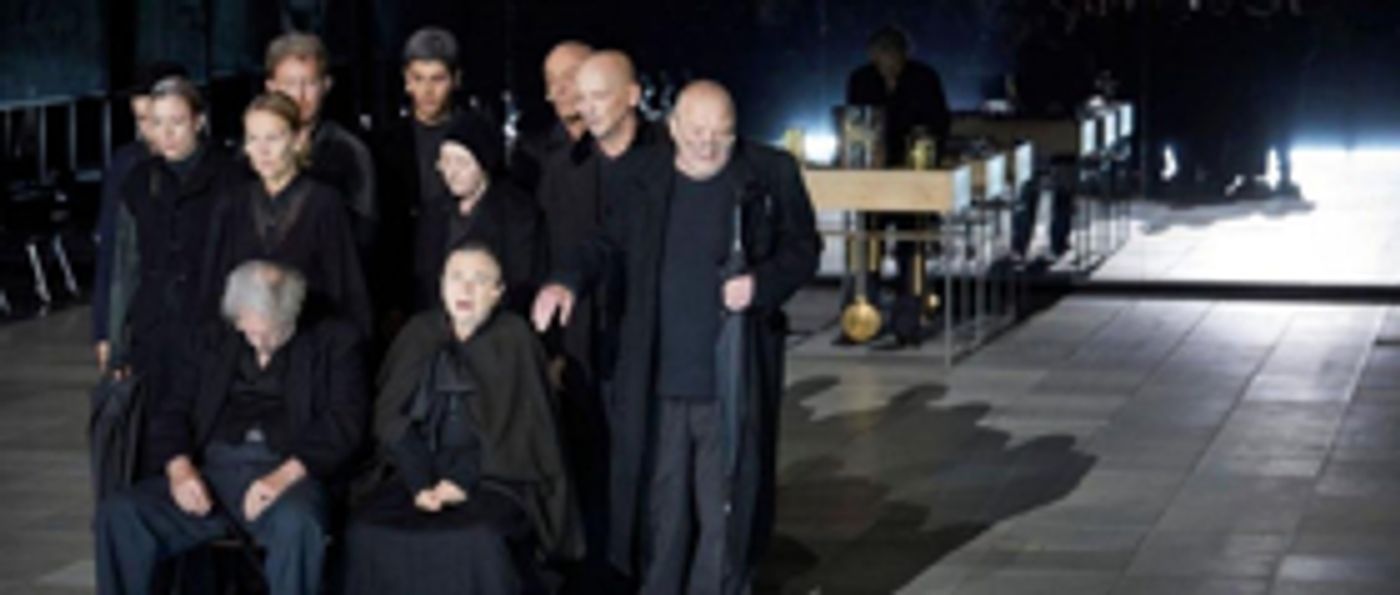Review: AVIGNON THEATRE FESTIVAL Presents DE DINGEN DIE VOORBIJGAAN By IVO VAN HOVE

Has anyone embodied the industrial elegance of central European theatre more fully than Ivo van Hove? His worlds are factory made with squares of glass, metal, and stone. His characters reside within an inescapable atmosphere of manufactured order. Whenever disorder breaks the mold, whether it be by cascading water and blood in his View From The Bridge, or by reams of black snow in De Dingen Die Voorbijgaan, now in performance at the Avignon Theatre Festival's Lycée Saint Joseph, its breach comes as a violent shock. Gazing at the looming black metal and industrial lighting yawning over Jan Versweyveld's slate tiled scenography, it's hard to imagine that this world could contain full people. However, such is the case in De Dingen Die Voorbijgaan which, within this environment devoid of softness creates a drama of the deepest intimacy and the most raw humanity. In Van Hove's glittering diadem of masterpieces, it is a particularly glowing jewel.
De Dingen Die Voorbijgaan, or in English The Things That Happen, is an adaptation of three novels by the Dutch writer Louis Couperus by Koen Tachelet. In Tachelet's hands what could be a confounding mess instead becomes dramatically symphonic. Taking place during a single Dutch winter, the play none the less spans generations. The conflicts and insecurities of a single family interlock in tessellations. It is in this way a brutalist answer to Marquez's "100 Years of Solitude." The ninety seven year old Grootmama Ottilie, performed beautifully by Frieda Pittoors, is haunted by a 60 year old crime. Her son, who is 75 years old and, unbeknownst to all, is the crime's sole witness, has been brought to illness with the burden of this knowledge.
The play also focuses on the engagement and subsequent marriage of the 30 something Lot and the young Elly. In one of the piece's more affecting scenes the couple escape the dreary north for Nice and Italy. The wall of upstage mirrors reverses and is replaced with a beautiful color projection of the Mediterranean shore. Observed without a drop of judgment by his aunt, the couple strip nude and in toying sexuality play with fruit and whipped cream. Nudity is nothing new to the Avignon Festival. All in all only three performances I've seen in the "In" have not had some form of full frontal. However, nudity has so far been framed either as artistic defiance, or as the result of some form of violence. It was restorative to at long last witness tenderness in the nude form.
The aunt monologues on the life of freedom she has in the south and embraces her lover who joins her on stage. Dressed in white linen, he looks as though he just finished a photo shoot for a romance novel. Lot re-represses his new found vulnerability and grieves his incapacity to be like this man. As he laments he strokes and caresses the man's body. Through this manifestation of his repressed sexuality we come to understand that he, much like his uncle, has been carrying the burden of a secret for the sake of the social order.
Performances are spectacular across the board. The cast's capacity to navigate their characters' bizarre passions without falling into the comically grotesque is sublime. Costumes by An D'Huys are archetypal, simple, and monochrome. She gives no overwhelming hint as to when we are, though you have no doubt that this family is of today. Upstage during the play Harry de Wit fiddles with a clock. Its tick tock reverberates in alternating rhythms and patterns. It is the hourglass ushering us to mortality. It is the bomb about to explode. It is patient and it is menacing. Paralyzed by regret, living in the past, and suffocating in solitude all on stage sacrifice their happiness to compensate for the sacrifices of those around them. From this seeming kindness they sustain a poignant and reverberating tragedy.
Photo Credit: Christophe Raynaud de Lage
Reader Reviews
Videos


